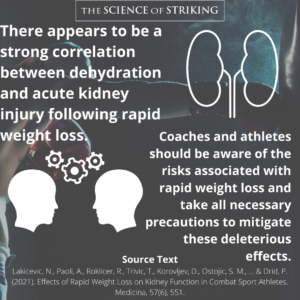Rapid weight loss (RWL) is commonplace in most combat sports in order to gain a perceived competitive advantage over opponents. Despite this, strong concerns remain regarding the safety for athletes undergoing this process. As the main mechanism of rapid weight loss is dehydration, it makes sense that the kidneys are placed under a significant degree of stress. This systematic review aimed to synthesize the current evidence in relation to the impact of rapid weight loss in combat sports athletes on kidney function.
A total of 10 studies, including 171 athletes from judo, TKD, MMA, muay thai and wrestling were included in the review. Creatinine (Cr) and blood urea nitrogen (BUN) were the most commonly used markers of kidney function, while urine specific gravity (USG) was the most commonly used measure of hydration.
Whilst care needs to be taken when interpreting dehydration using USG alone, due to some inherent limitations of the measurement, there appears to be a strong correlation between dehydration and acute kidney injury following rapid weight loss.
Acute kidney injury and chronic kidney disease have been linked, however more longitudinal data is required to ascertain the effect of repeated RWL on chronic kidney function.
Coaches and athletes should be aware of the risks associated with rapid weight loss and take all necessary precautions to mitigate these deleterious effects.
#rapidweightloss #weightcutting #combatsports #thescienceofstriking #muaythai #taekwondo #wrestling #judo #mma #mixedmartialarts #onefc #ufc #bellator
Lakicevic, N., Paoli, A., Roklicer, R., Trivic, T., Korovljev, D., Ostojic, S. M., … & Drid, P. (2021). Effects of Rapid Weight Loss on Kidney Function in Combat Sport Athletes. Medicina, 57(6), 551.


